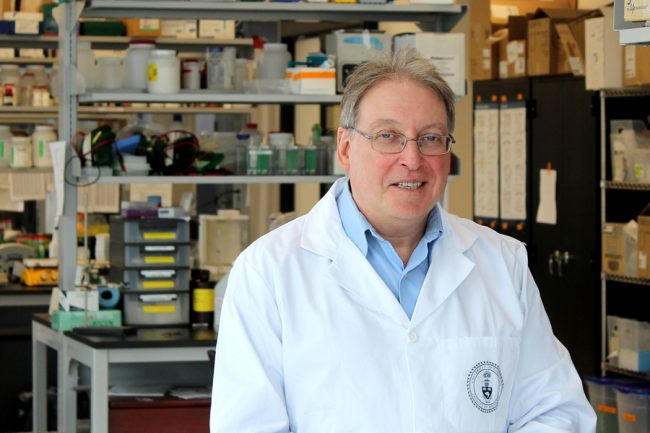Nearly 20 years ago, Professor Paul Santerre (Dentistry, IBBME) and his team pioneered a new way of making medical implants that reduces the risk of blood clots and infections. Now, the technology is set to go global as it is acquired by Evonik, a multinational specialty chemicals firm that is now maintaining a presence in Toronto.
“This is a professor’s dream,” says Santerre. “It the best outcome for our startup: investment, sales and drawing a major company here to do product development.”
From catheters to artificial hips, implants are a critical component of modern health care. But the surfaces of the materials from which they are made can serve as a habitat for infectious bacteria. They can also trigger the body’s natural responses, including life-threatening blood clots released through a process known as thrombosis.
Santerre’s technology works by modifying the surface of materials designed to be implanted into the body. These modifications make it harder for certain proteins — such as those that cause blood clots, whether secreted by invading bacteria, blood platelets or blood cells — to stick to the surface.
At the heart of the innovation is a series of short-chain molecules, called oligomers. Like another famous non-stick material, Teflon, the oligomers that Santerre conceived contain fluorine as part of their chemical structure.
But whereas Teflon must be spray-coated onto a surface after it’s made, Santerre’s additives can be mixed directly into molten plastic. As the plastic cools, the oligomers migrate to the top few nanometres, creating a non-stick surface without the need for an additional manufacturing steps.
In 2001, the additives were part of a suite of innovations used to form the U of T spinoff company, Interface Biologics, Inc. (IBI), based in downtown Toronto.
This week, IBI announced that its surface modification division will be acquired by Evonik. Active in over 100 countries around the world, Evonik has more than 32,000 employees who last year generated more than €13.3 billion in sales.
The IBI team will support Evonik’s continuity of the business under a two-year transition services agreement. Evonik is expected to build on IBI’s expertise in surface modification by maintaining a presence in Toronto
“Evonik was impressed not only by the IBI story, but by the rich and growing innovation ecosystem across U of T, and Toronto more generally,” says Santerre.
Santerre says that the new deal will take the technology to larger markets faster than would have been possible with IBI. But he is even more excited by what this means for the future of entrepreneurship and commercialization at U of T.
“Evonik is now the second major multinational health technology company to want to live here,” he says. “They will likely catalyze many more to come.”


